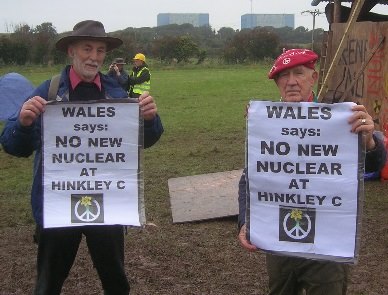 Illustration [artist's rendition] of Hinkley Point C nuclear station. Photograph: EDF Energy/PA An article by Graham Ruddick in the Guardian, entitled "From feast to farce: how the big Hinkley Point C party was put on ice," reported that "the UK government was meant to be celebrating, but delays and second thoughts have left the project stalled."
Illustration [artist's rendition] of Hinkley Point C nuclear station. Photograph: EDF Energy/PA An article by Graham Ruddick in the Guardian, entitled "From feast to farce: how the big Hinkley Point C party was put on ice," reported that "the UK government was meant to be celebrating, but delays and second thoughts have left the project stalled."
The two new reactors at Hinkley Point C in Somerset, southwest England, would each be 1,600 Megawatt-electric French Areva European Pressurized Reactors (EPRs).
EPRs under construction in Finland (Olkiluoto 3) and France (Flamanville 3) are years behind schedule, and billions of dollars over budget. A major fabrication flaw in the reactors' lids and bases at those two projects may prove fatal, preventing completion and permanently blocking operation.
A proposed new EPR was blocked by an environmental coalition, including Beyond Nuclear, at Calvert Cliffs, Maryland several years ago. That major environmental victory, blocking the flagship EPR in the U.S., likely prevented a total of seven EPRs proposed across the U.S., from Nine Mile Point, NY to Callaway, MO. Additional proposed new EPRs under consideration at Darlington, Ontario were also rejected.
The Guardian article reports that, just two hours after the board of directors of Electricité de France (EDF) voted, by a narrow 10 to 7 margin, to proceed with building the Hinkley Point C nuclear power plant in the U.K., the new British prime minister's cabinet secretary in charge of the file, announced the British government would review the matter, and not announce its decision in early autumn.
The high-level confusion/international incident was illustrated clearly by the sudden departure of Chinese nuclear power industry investors, who had flown to Europe for the party celebrating EDF's decision, only to have the U.K. government pull the rug out.
The EDF board vote would have been 10 to 8, but an opponent of the project resigned in protest before the vote took place, citing the extreme risk of the proposal. The six labor union representatives on the EDF board voted as a bloc against proceeding with Hinkley Point C. Their position is that the top priority should be placed on safety repairs and upgrades at France's own current fleet of 58 aging atomic reactors, the second most of any country on Earth. (The U.S. has 100 operating reactors.)
Terry Macalister reported in the Guardian on July 7th that the estimated price tag for Hinkley Point C had risen to a whopping 37 billion British pounds, or nearly $49.5 billion U.S., at current exchange rates.
At a Beyond Nuclear sponsored presentation in Takoma Park, Maryland on July 21st, U.K. professor and solar power expert, Keith Barnham, reported that, at certain times of year, British taxpayers/ratepayers would subsidize 7/9ths of the cost of the electricity exported to France from Hinkley Point C, simply because the demand does not exist in the U.K. He pointed out the irony of going forward with such a U.K. subsidy of France, after the BREXIT vote removing the U.K. from the European Union. Barnham is author of The Burning Answer: The Solar Revolution, a Quest for Sustainable Power.
Update on July 29, 2016 by
 admin
admin
Climate News Network also reported on this story. It was reprinted in EcoWatch. The article reports:
...[C]ritics of the controversial project were delighted. John Sauven, the executive director of Greenpeace, said: "Theresa May now has the chance to stop this radioactive white elephant in its tracks."
"She should look at the evidence and see that this deal would be a monumental disaster for the taxpayers and the bill payers. Countless experts have warned that for British families this power station will be terrible value for money," Sauven added.
Mycle Schneider, lead author of the World Nuclear Industry Status Report (just updated on July 13th), was interviewed by BBC, and expressed surprise at the sudden reversal regarding Hinkley Point C.





 May 27, 2020
May 27, 2020